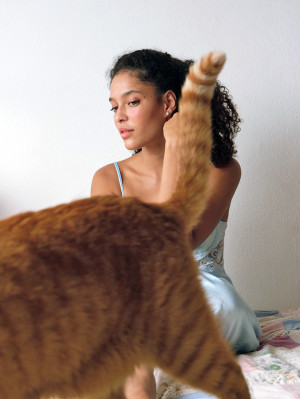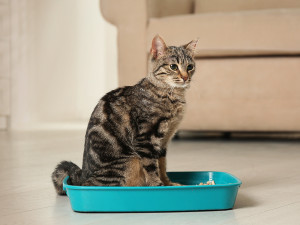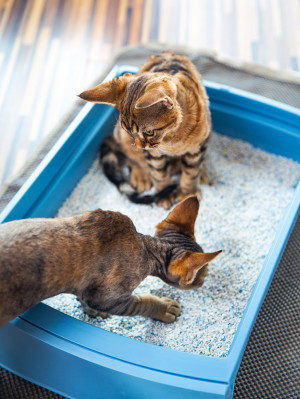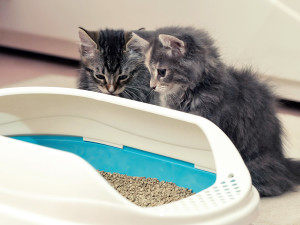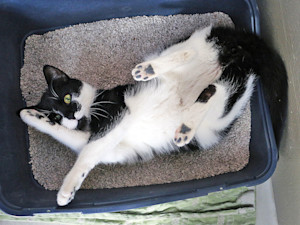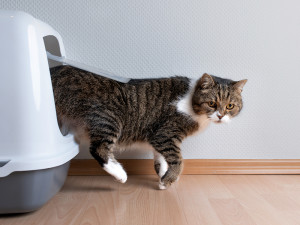Why Does My Cat’s Pee Smell So Bad? Cat-Urine Odor Explained
Cat pee already has an unpleasant odor. But if it gets worse, you’re going to need to do something about it.
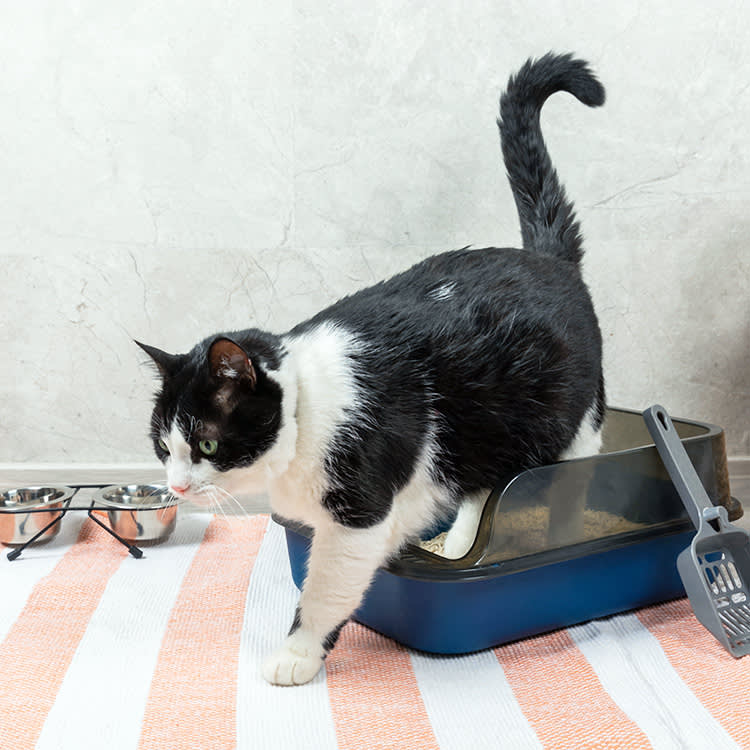
Share Article
In This Article:
Why Does Cat Pee Smell So Strongly? Is Strong-Smelling Cat Pee Normal? What if the Smell of Your Cat’s Pee Suddenly Changes? 7 Reasons Your Cat’s Pee Smells Worse When to See a Vet Can You Make Stinky Cat Pee Smell Better? How to Get the Pee Smell out of Your Home
Let’s just start by acknowledging that cat pee doesn’t smell good. Even healthy, normal cat urine has an odor. However, not smelling good and smelling bad (or overly strong) can be two very different things.
If your cat’s pee is smelling stronger than usual, it’s never something to ignore. Let’s look into why cat pee can take on a stronger odor and how you can help fix that issue.
Why does cat pee smell so strongly?
You may not have noticed, but cat pee doesn’t actually smell that bad when it first comes out of a kitty. It takes a little bit of time to develop that strong ammonia smell we’re so familiar with. Cat urine is filled with things like urea and the amino acid felinine. Urea is broken down into ammonia, and felinine is broken downopens in new tab into a compound you won’t recognize (3-mercapto-3-methylbutan-1-ol). But just know that it has a strong sulfur odor, as a precursor to pheromones. Both of these contribute to the pungency of cat pee.

Is strong-smelling cat pee normal?
Cat urine definitely won’t win any awards in the freshness department. It just naturally smells stronger than the urine of other animals. Besides containing compounds that become more odiferous with time, cat urine is also more naturally concentrated than other animal urine. This means it has more waste products and less water, resulting in a stronger smell.
Is a sudden change in the smell of your cat’s pee a cause for concern?
Cat pee smells bad — we know that now. But what if that bad gets worse? Any changes in the odor, appearance, or even frequency of your cat’s urine is a reason to see a vet. You see, cat pee will always smell, but that smell should stay relatively consistent if everything is functioning as it should. A sudden change in the strength of the smell, or the smell itself, could mean your cat’s body is going through something that likely needs to be looked at.
7 reasons why your cat’s pee smells worse
Changes in the smell of your cat’s pee are nothing to brush off. Most often, a stronger-than-normal scent indicates a health condition that you’ll want to discuss with your vet.
High protein diet
Cats are the obligate carnivores of the pet world. They need a lot of protein to thrive. That protein is great for providing energy and maintaining muscle, but it also produces a lot of waste urea that eventually gets broken down into ammonia, contributing to strong-smelling pee. The higher the protein in a diet, the stronger your cat’s urine may smell. This may cause smellier poops, too.
Dehydration
A cat’s urine is already highly concentrated, meaning there are lots of waste products in there that can create a smell. Dehydration further concentrates the urineopens in new tab — and therefore, its smell — because there is less water in the body that needs to be expelled. Dehydration can quickly become serious for a cat’s small body, so see your veterinarian.
Urinary tract infection (UTI)
Bacterial urinary tract infections are fairly uncommon in cats. But when they do occur, they can cause stinky pee. Some would describe it as a “fishy” smell, while others say it just smells stronger. Either way, the urine may also have a cloudy or bloody appearance, and your kitty may need to go frequently. Veterinarians can treat UTIs with antibiotics and sometimes a diet change.
Kidney disease
The kidneys play a key role in how your cat’s urine smells. In cats with kidney diseaseopens in new tab, these vital organs decrease in their efficiency, which can lead to a stronger pee smell. These kitties may also drink a lot of water and pee frequently. Feline kidney disease doesn’t have a cure but can sometimes be managed with the help of your veterinarian.
Diabetes
Diabetes stems from an issueopens in new tab with the hormone insulin, which moves glucose from the bloodstream into the cells. When there’s not enough insulin, blood glucose can get very high, overflowing into the urine. Not only does this create more overall pee, it can also make it smell sweet and look sticky. Feline diabetes can be treated with help from your vet.
Stress and anxiety
Stress is a crazy thing that can affect all parts of the body, even making a cat’s pee smell worse by causing inflammation or changing the urinary tract’s pH. Stress and anxiety can also make a cat pee outside the litter box, potentially leading to some smelly messes.
Marking
We all know that male dogs often lift their leg to pee, but cats have an even wilder tactic: They can spray urine out behind them. Why? To let other cats know this spot is theirs or to attract a mate. Marking is less common in neutered males or spayed females but isn’t off the table completely. This urine can smell bad because we often don’t find it until the smelly degradation process is well underway.
When to see a vet for bad-smelling cat pee
As you get to know your cat, you’ll also get to know the smell and frequency of their pee. Sorry, but it’s true, and that’s actually a good thing. Knowing what’s normal can help you more quickly catch the abnormal. Any sudden changes in your cat’s pee smell, color, or frequency mean they should see a vet.
Treatment for smelly cat pee
With an exam, urinalysis, and potentially other tests, your vet will be able to tell if your cat’s smelly pee is coming from an infection, diet, or something else entirely. They will then be able to provide antibiotics for infections, medications, and diet changes for diabetes and kidney disease, or recommend lifestyle changes that can help with stress or marking.
Can you make stinky cat pee smell better?
Unfortunately, the smell of cat pee is what it is. There’s nothing you can do to change it other than to make sure your kitty is healthy by providing them with a high-quality diet, fresh water, exercise, and regular veterinary care. This can help prevent some of the health issues that may lead to smellier pee.
Otherwise, do your best to keep your cat’s litter box clean, especially if you have multiple cats who have to share a litter box. (Ideally, you would have one litter box per cat, plus one extra, for their comfort.) Consider an automatic litter box if you just can’t seem to scoop enough.
Also, try to keep your cat’s environment calm, consistent, and predictable. A regular feeding and playtime schedule helps decrease stress because a cat will know what to expect. Giving them their own space with a choice of beds and toys — so they don’t get bored and don’t have to share — may help as well.
How to get the smell of cat pee out of your home
The other major downside to cat pee is that it’s hard to clean up if your cat pees anywhere other than in their litter box. When cat pee gets into fabrics or carpets, those same compounds that cause the smell tend to dig in and stay put. Cleaning cat pee often requires multiple steps of blotting and then applying an enzymatic cleaner to fully remove all parts of the urine.
Bottom line
Cats naturally have strong-smelling pee because of the waste products that are in it. The smell tends to get worse the longer it sits, and can become more intense with certain health issues, such as dehydration or diabetes. If your cat’s urine has suddenly taken on an excessively bad odor, see your veterinarian.
FAQs
Why does my cat’s pee smell stronger than usual?
A stronger smell to your cat’s pee can indicate many health issues. Serious issues such as dehydration, diabetes, and UTIs may be to blame and will require veterinary treatment.
What can I give my cat to reduce the urine smell?
There’s no magic anti-odor pill that you can give your cat to freshen the scent of their urine, but you may run across supplements or diets designed for this. Be sure to speak with your veterinarian to decide if any of these products or diets are right for your cat. Otherwise, ensuring they stay hydrated and healthy is your best option
How do I get rid of cat pee smell?
Cat pee odors are very difficult to remove from your home and often require a multi-step approach. First, blot up as much of the liquid as possible. Next, apply an enzymatic cleaner to fully remove the urine components. Let it dry, then vacuum or wipe the area.
What is in cat urine that makes it smell so bad?
Urine is the body’s way of getting rid of excess water and waste. Some of those waste products, mainly urea and felinine, emit strong odors as they decompose, giving cat pee its distinctive smell. Typically, the older the urine is, the more it will smell.
References
“A Major Urinary Protein of the Domestic Cat Regulates the Production of Felinine, a Putative Pheromone Precursor.” Science Direct. Oct 2006. https://www.sciencedirect.com/science/article/pii/S1074552106003097opens in new tab.
“Chronic Kidney Disease.” Cornell Feline Health Center. https://www.vet.cornell.edu/departments-centers-and-institutes/cornell-feline-health-center/health-information/feline-health-topics/chronic-kidney-diseaseopens in new tab.
“Feline Diabetes.” Cornell Feline Health Center. https://www.vet.cornell.edu/departments-centers-and-institutes/cornell-feline-health-center/health-information/feline-health-topics/feline-diabetesopens in new tab.
“Hydration.” Cornell Feline Health Center. https://www.vet.cornell.edu/departments-centers-and-institutes/cornell-feline-health-center/health-information/feline-health-topics/hydrationopens in new tab.

Dr. Chyrle Bonk, DVM
Dr. Chyrle Bonk has been a mixed-animal veterinarian since 2010, with a special interest in rehabilitation. When she's not practicing or writing about veterinary medicine, you may find her exploring the outdoors with her family or tending to her cows, horses, chickens, or cats and dogs.
Related articles
![two cats sharing litter box]()
Can Cats Share a Litter Box?
The better question is should they?
![Two cute kittens are sitting near their litter box.]()
Best Odor-Control Cat Litter
A necessity, really.
Can You Flush Litter?
No. And here’s why.
![Funny black and white cat laying in litter box.]()
Why Is My Cat Chilling in the Litter Box?
Here are four reasons why the litter box is your cat’s new favorite spot.
Why Does My Cat Poop Outside of the Litter Box?
The worst kind of surprise.
![cat coming out of litter box]()
What to Do When Your Cat Refuses to Be (Litter) Boxed In
An expert explains why kitties are so particular about where they pop a squat.

